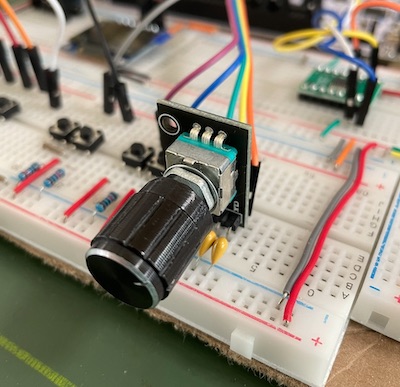
A rotary encoder library for embedded rust applications

no-std supportThe RotaryEncoder can operate in a number of different modes, these modes provide different types of feature sets and are individually gated behind feature flags to keep the binary size to a minimum.
The following modes are currently provided:
| Feature flag | Mode | Desc. |
| ------------- |----------------| -------|
| standard | StandardMode | Uses a state machine for transitions |
| angular-velocity | AngularVelocityMode | Same as standard but with additional angular-velocity calculations |
StandardMode example```rust fn main() -> ! { // Configure DT and CLK pins, typically pullup input let rotarydt = gpiopin1.intopullupinput() let rotaryclk = gpiopin2.intopullupinput(); // Initialize the rotary encoder let mut rotaryencoder = RotaryEncoder::new( rotarydt, rotaryclk, ).intostandard_mode(); // ...timer initialize at 900Hz to poll the rotary encoder loop {} }
fn timerinterrupthandler() { // ... get rotary encoder let rotaryencoder = ... // Update the encoder, which will compute its direction rotaryencoder.update(); match rotary_encoder.direction() { Direction::Clockwise => { // Increment some value } Direction::AntiClockwise => { // Decrement some value } Direction::None => { // Do nothing } } } ```
I've experimented a lot with different combinations in order to make Rotary Encoders behave predictably because generally speaking they are fickle at best. From my experimentation I've learnt that using GPIO pin based interrupts generally isn't a good idea because they are more prone to noise and increase the risk of misfires and jumps. Timers on the other hand provide a low pass filtering quality because they don't pick up higher frequency switching that GPIO interrupts do. I have found that using a Timer between 850-1000Hz seems to work best.